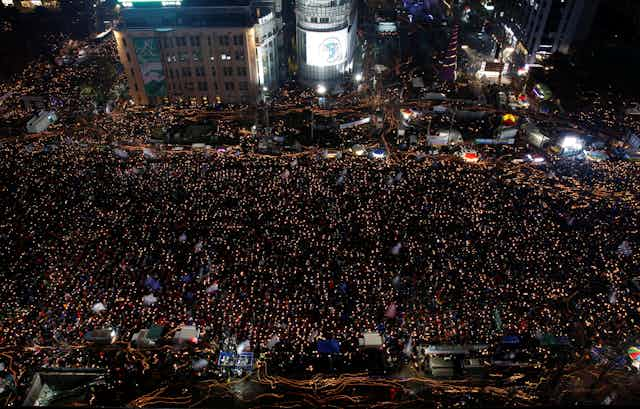The president of South Korea has announced she is willing to resign before the end of her five-year term. Park Geun-Hye made the announcement during her third televised apology to the nation, over a corruption scandal that has gripped the country for weeks.
She has left it to the National Assembly to decide the timing of her departure for a smooth transition of power.
The move comes only two days after her refusal to step down and has been interpreted as an attempt to head off an impending impeachment in the National Assembly, and as a concession to a series of large protests by South Koreans.
Despite the cold and snow, South Koreans held what is thought to be the largest protest yet on Saturday November 26, calling on President Park to resign. She has been struggling with an ongoing influence-peddling scandal involving a long-term friend and confidant, Choi Soon-sil, which may still lead to her prosecution.
Growing protests
The protest was the latest in a series of marches that have been held every Saturday since the scandal broke in October. Crowds have included teenagers in school uniforms, young parents carrying strollers, senior citizens, and even opposition party leaders, all holding candles and signs calling for the president to stand down.
Although organisers and police have frequently been at odds about the number of people attending, media reports have noted that the gatherings are the largest political protests since the 1986-1987 rallies that brought about democratisation after years of authoritarianism.
Alleged corruption scandals involving the cronies and families of presidents are not unusual in South Korean politics, but they have not usually led to such a strong public response. Former presidents have all been plunged into these kinds of scandals in the latter years of their tenure.
The first president after democratisation in 1987, Roh Tae-Woo (1988-1993), was charged with corruption after he left office and sentenced to 17 years in prison.
The second son of president Kim Young-Sam (1993-1998) was involved in a bribery scandal in May 1997, while Kim was still in the office. A similar scandal plagued Nobel prize-winning president Kim Dae-Jung (1998-2003) five years later.
Another bribery scandal involved Roh Mu-hyun (2003-2008), who was a human rights lawyer before becoming president. Roh killed himself in 2009.
Park’s predecessor, Lee Myung-Bak (2008-2013), also became embroiled in a bribery scandal involving his elder brother.
Why so angry?
Despite political scandals and controversies affecting every president since South Korea’s democratisation, every president has finished their five-year term since the nation’s current constitution came into effect in 1987.

What’s different this time? Perhaps the involvement of Park’s confidante Choi Soon-sil, who is alleged to have extorted millions of dollars from South Korean businesses with the president’s help. Two close aides – An Chong-Bum and Jeong Ho-Seong – have also been formally charged.
Park’s supporters have dismissed the accusations against the president as a “witch hunt” and said the protesters are running a “people’s court”.
Park made two other apologies – on October 25 and on November 4 – since the scandal erupted. But her approval rating continued to drop.
The protesters’ core criticism of Park is she has embarrassed the country. Many have expressed their sense of betrayal by an elected leader who is alleged to have shared power with her unelected friend.
Apart from the extortion charges Choi is facing, she is thought to have edited Park’s speeches, had access to confidential government documents and advised Park on what to wear.
A history of civic engagement
South Korea has a history of political protests and direct participation that dates from even earlier than 1987.
The All People’s Conference (Manmin Kongdonghoe) originally started as a subordinate civic group of the Independence Club (Dongnip Hyeophoe) that was an association formed by reform-minded elites in 1897. Now defunct, it evolved into a congress of Koreans in 1898.
Then there was 1919 March 1st Movement, one of the earliest examples of Korean resistance against Japanese colonial rule, which began in 1910. And the 1960 April 19 Revolution was a popular uprising against the Rhee Syng-Man administration’s electoral corruption.
It brought about Rhee’s resignation, but South Korea’s short-lived democracy soon ended as the current president’s father, Park Chung-Hee seized power with a coup d'etat in May of the following year.
Civic culture clearly remains vibrant in South Korea as the mass demonstrations across the past five Saturdays illustrate. These recent protests are a sign that the South Korean people are willing and eager to play an active role in the political modernisation of their country.

